Unity Environmental University Destination Education Experiences
December 14, 2022
Build Lifelong Relationships While Learning in Unique Maine Locations
Come live where you learn! Take your hybrid learning experience to the next level and gain unique experiences with courses taught at Unity Environmental University’s Field Station in Unity, Maine. You’ll build relationships that will last a lifetime with your professors and peers. With room & board options available, and access to financial aid opportunities, the ability to join us for 1 or 2 classes makes this option more accessible and affordable than ever before!
Opportunity awaits! Join us today!
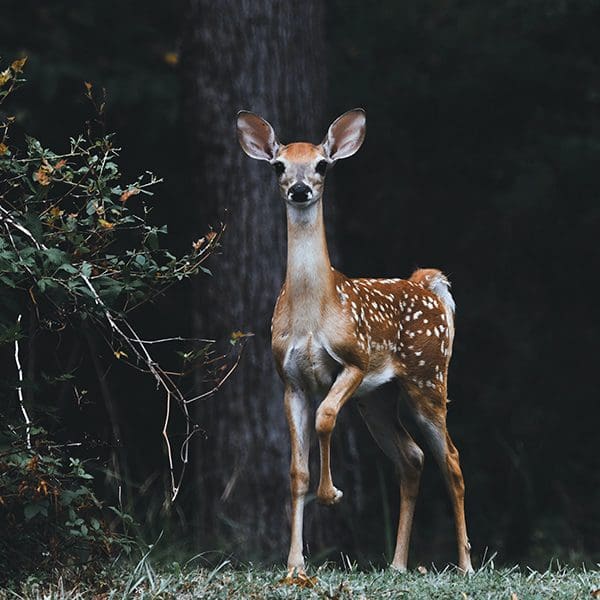
Explore Wildlife
Discover all of the things that make wildlife and fisheries unique!
WF 105 Introduction to Wildlife and Fisheries Biology | 3 credits
This course will introduce students to the field of wildlife and fisheries biology. It will provide a framework for understanding management concepts necessary for future studies.
Contact Hybrid Learning Coach, Ashleigh Gordon, to sign up today!
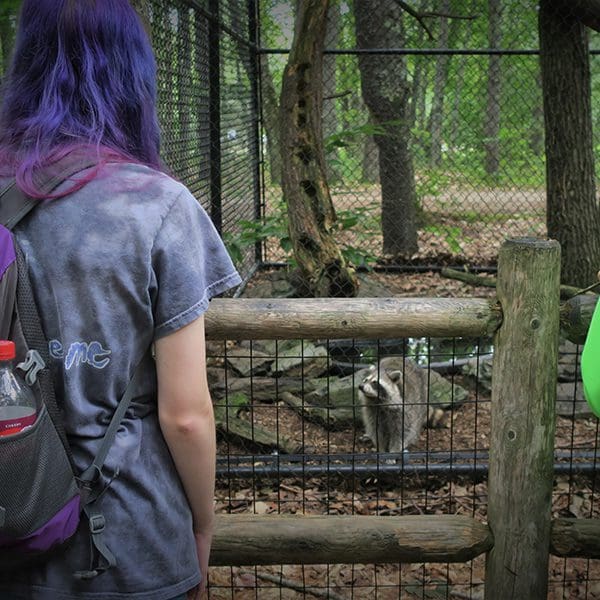
Enjoy Working With Animals
Learn how to care for wildlife in captive settings.
CW 101 Care of Captive Wildlife | 3 credits
In this course, students will begin to understand the issues of caring for wild animals in captive settings. Students will learn how to access resources about animals and best care practices and develop a foundation in the basic principles and ethics of animal care.
Contact Hybrid Learning Coach, Ashleigh Gordon, to sign up today!

Understanding the Big Picture
From the ground up, discover how plants give structure to ecosystems and support the wildlife species.
BI 205 Canopy to Ground Cover | 3 credits
Plants give structure to ecosystems and support the wildlife species within them. In this course, students will study how key aspects of plant biology interact with environmental conditions to influence plant growth, distribution, and abundance, and consider how these factors affects dependent wildlife. Throughout the course, students will learn to identify and characterize trees, shrubs, and other plant species representing plant families found in diverse habitat types.
Contact Hybrid Learning Coach, Ashleigh Gordon, to sign up today!

Exploration & Adventure
Learn the fundamental skills of outdoor navigation!
HL 194 Map, Compass, and GPS | 1 credit
Map, Compass and GPS will teach fundamental skills of outdoor navigation used during recreation, scientific, law-enforcement, and search and rescue operations in wilderness or natural settings. After completing this course, students will be able to “read” a landscape, utilize common topographic maps, declinate a compass, plot routes and shoot bearings accurately. They will be able to integrate GPS use with map and compass skills to accurately track and verify routes, navigate to waypoints and quickly manage mapping data for remote collaboration with other users.
Contact Hybrid Learning Coach, Ashleigh Gordon, to sign up today!
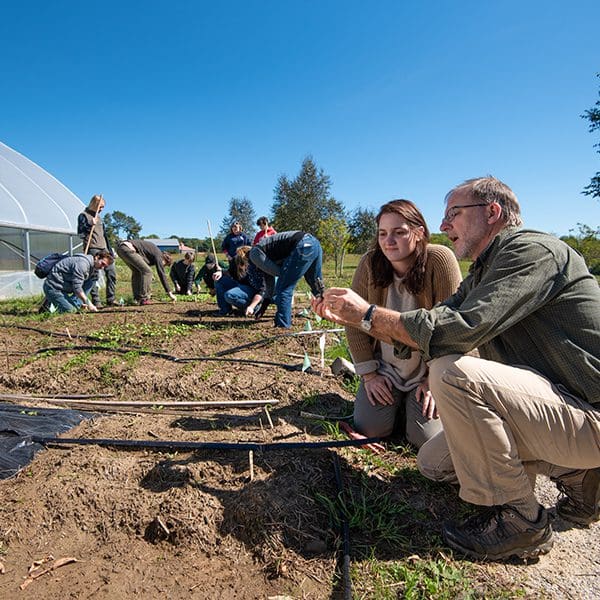
Cultivate the Soil
Get your hands in the dirt and discover how to make the most of your growing season!
HL 186 Organic Gardening in the Fall | 1 credit
Can you really start a vegetable garden in September or October? With some clever season-extension techniques you can! We will plant several crops in structures that are heated only by the sun, and students will be able to harvest their first crop before the term ends. Along the way, we’ll study soils, fertilization, cultivation, and how to make the best use of the waning photoperiod.
Contact Hybrid Learning Coach, Ashleigh Gordon, to sign up today!
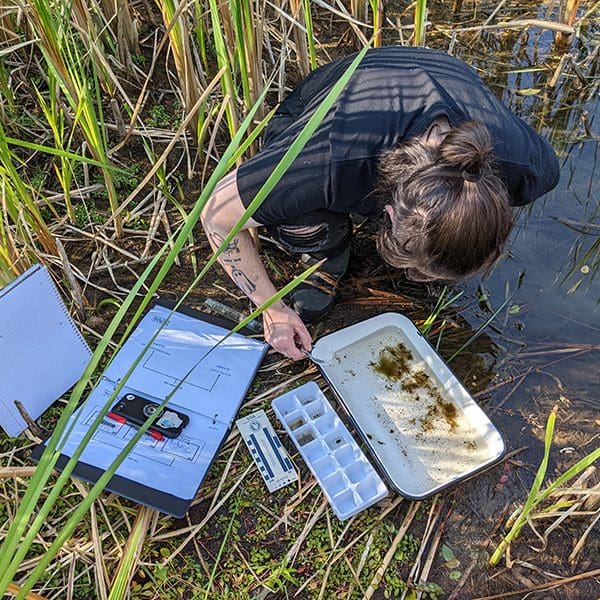
Vital Water Sources
All living things need water. Discover what problems our water sources are facing and learn what you can do to help.
HL 198 Streams, Rivers, and Lakes | 1 credit
Surface water bodies, such as rivers and lakes, create unique habitats, ecosystems, and food and water resources for wildlife. They also serve vital functions in human society related to transport, industry, municipal water resources, energy generation, and recreation. Unfortunately, a significant proportion of these water bodies are experiencing a variety of challenges from pollution, to invasive species, and climate change. In this experiential course students will work in teams to collect water quality data and analyze land use and water flow characteristics in watersheds local to the campus. The goals are to introduce environmental issues relating to freshwater ecosystems, learn about stakeholders and their interests, and familiarize students with a variety of scientific tools for characterizing water bodies. This course is designed for students who are pursuing careers in conservation law enforcement, wildlife and fisheries biology, or environmental science.
Contact Hybrid Learning Coach, Ashleigh Gordon, to sign up today!

Law Enforcement Fundamentals
Learn about our criminal justice system from an expert with experience!
HL 1XX Introduction to Conservation Law Enforcement | 1 credit
Introduction to Conservation Law Enforcement provides a historical and present day overview of the conservation law enforcement profession, and the dual role of the modern conservation officer as law enforcement officer and protector of our natural resources. A wide variety of professional roles are examined, including game warden, park ranger, forest ranger, and marine warden.
Contact Hybrid Learning Coach, Ashleigh Gordon, to sign up today!

Safety First
Learn how to properly handle firearms, use and maintain them.
HL 298 Firearms | 3 credits
This course covers the handling, use and maintenance of firearms by law enforcement officers and wildlife biologists. Loading techniques, cleaning methods, and inspection procedures of service weapons used by law enforcement agencies will also be covered. Students will receive range experience and qualify on a police firing range (using State of Maine standard) with each weapon. Firearm safety will be stressed throughout the course along with State of Maine laws on liability, personal responsibility, gun control, concealed weapons, and self-defense. This course includes both classroom and practical sessions.
Contact Hybrid Learning Coach, Ashleigh Gordon, to sign up today!

Understand the Law
Learn how it integrates into everyday life in our society.
CL 201 Introduction to Criminal Justice | 3 credits
This course provides an introduction to the components and processes of the criminal justice system in the United States. Topics include the history, structure, function, and philosophy of our system of justice and how it integrates into everyday life in our society. Students will discuss our justice system’s historic English roots, the evolution of American law, and the variety of law enforcement agencies, including their distinctive operational characteristics. Particular attention will be given to conservation officers and their specialized role in resource protection.
Contact Hybrid Learning Coach, Ashleigh Gordon, to sign up today!
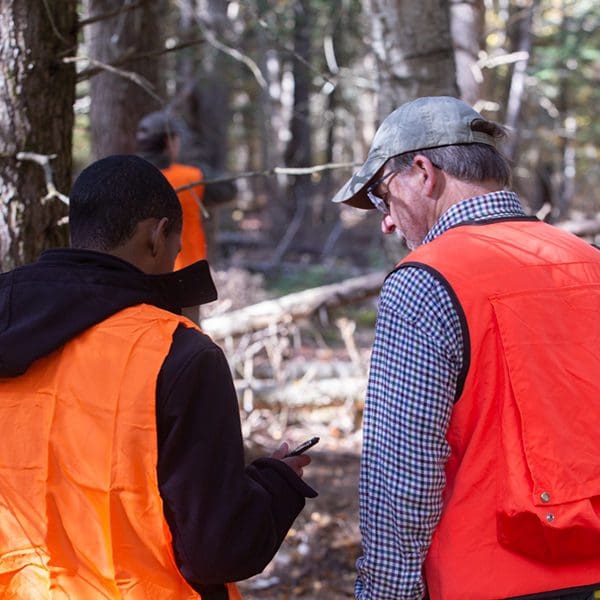
Apply Ecology to Conservation
Learn the patterns and processes operating in populations, communities, and ecosystems.
BI 206 Ecology | 3 credits
This course will provide an overview of modern ecology as applied to conservation and management. Students will learn the patterns and processes operating in populations, communities, and ecosystems, focusing on ecology as the study of interactions among organisms and between organisms and their environment. The course will investigate reciprocal influences between the physical environment and species distributions, populations dynamics, multi-species interactions and community structure, and how materials and energy move through ecosystems. Students will learn how ecosystems function in ways that benefit humans and wildlife, and how conservation or management decisions can enhance or impair these functions.
Contact Hybrid Learning Coach, Ashleigh Gordon, to sign up today!
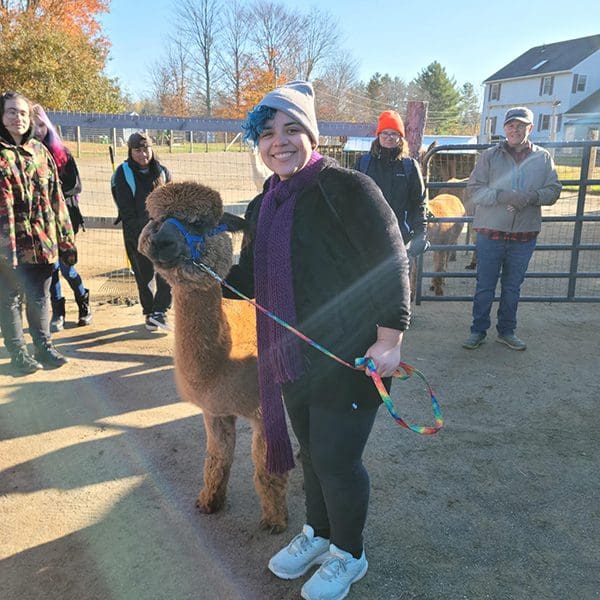
Why do they do what they do?
Learn the study of genetics, physiology, and ecology of animal behavior.
WF 301 Animal Behavior | 3 credits
This course deals with the study of genetics, physiology, and ecology of animal behavior in an evolutionary context. Behavioral adaptations are discussed with particular reference to their ecological significance.
Contact Hybrid Learning Coach, Ashleigh Gordon, to sign up today!
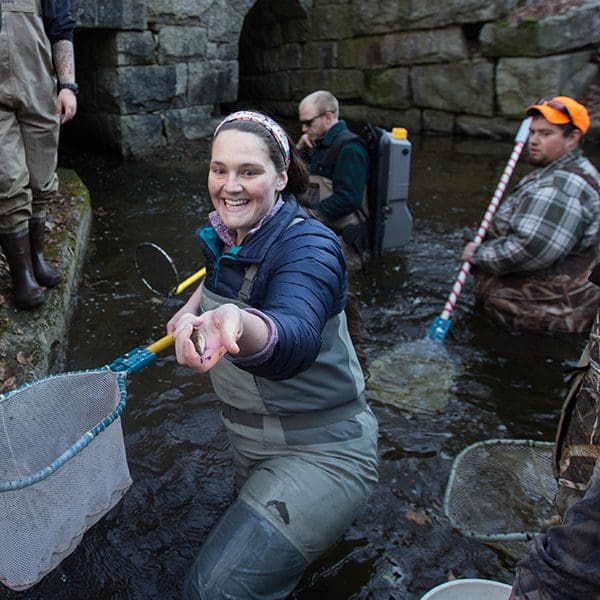
Protect our Wildlife from Threats
Learn how to manage habitats in different terrestrial and aquatic environments to protect them from threats.
WF 310 Habitat Assessment and Management | 3 credits
Sustaining wildlife populations in the face of climate change and other threats requires a sound understanding of the habitat concept and adaptive approaches to habitat management. This course explores the concepts, principles, and terminology associated with understanding how wildlife identify and use habitat, and how managers assess and manage habitat. Students will learn approaches to measuring, assessing, and managing habitat in different terrestrial and aquatic environments.
Contact Hybrid Learning Coach, Ashleigh Gordon, to sign up today!
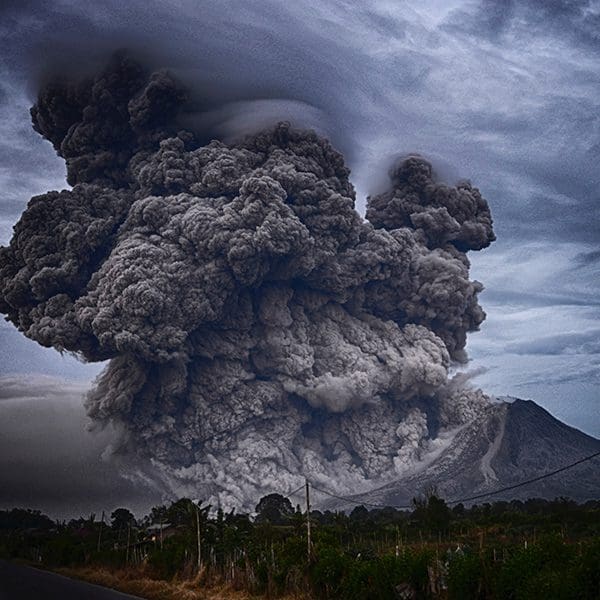
Understand Our History
Delve into the topics of American colonization, the history of natural disasters, and the environmental consequences of urbanization and industrialization?
HU 201 American Environmental History | 3 credits
How have Americans interacted with nature, and how has nature, in turn, shaped American society? This question lies at the heart of environmental history, which seeks to understand the history of human interactions with the natural world. As we delve into this field, we will consider topics such as American colonization, the history of natural disasters, and the environmental consequences of urbanization and industrialization. We will think together about how nature differs among people, places, and times; how the meanings people give to nature inform their cultural and political activities; and how these historical forces continue to shape the American landscape and its people.
Contact Hybrid Learning Coach, Ashleigh Gordon, to sign up today!

Blend Art and Science
Create artwork in a variety of media that involve close observation of the natural environment interpreted through.
AR 301 Designing with Nature | 3 credits
How can observation and understanding of natural phenomena influence and guide the making of art? What information can art convey about the intricacies of the natural world? This course will bring art and science together as we create artwork in a variety of media that involve close observation of the natural environment interpreted through.
Contact Hybrid Learning Coach, Ashleigh Gordon, to sign up today!

Protecting biodiversity globally
Learn how to create solution-based framework when addressing complex, multifaceted problems.
BI 305 Conservation Biology | 3 credits
Conservation Biology focuses on the biological and human dimensions of protecting biodiversity globally. This course investigates the value of biodiversity, threats to biodiversity, and practical approaches for conservation of ecosystem diversity, species diversity, and genetic diversity within species. This course will use a solution-based framework when addressing complex, multifaceted problems as are often faced by conservation biologists. Specific concepts include minimum viable populations, extinction patterns, habitat fragmentation, habitat restoration, and prioritizing conservation areas.
Contact Hybrid Learning Coach, Ashleigh Gordon, to sign up today!

Human Culpability
Explore how our choices greatly impact the sustainability of the world.
IS 202 Unnatural Disasters | 3 credits
This course emphasizes that natural disasters extend beyond the environment and natural world. While we will be learning the science behind these events, we will also be exploring how natural disasters are influenced by human decisions and how they affect the choices, outlooks, and experiences of societies and individuals. Throughout the term, we will explore how anthropogenic actions influence the severity of these events. This course challenges us to understand a natural disaster event as a multi-faced experience with diverse and long-lasting consequences on the earth, societies, and individuals.
Contact Hybrid Learning Coach, Ashleigh Gordon, to sign up today!
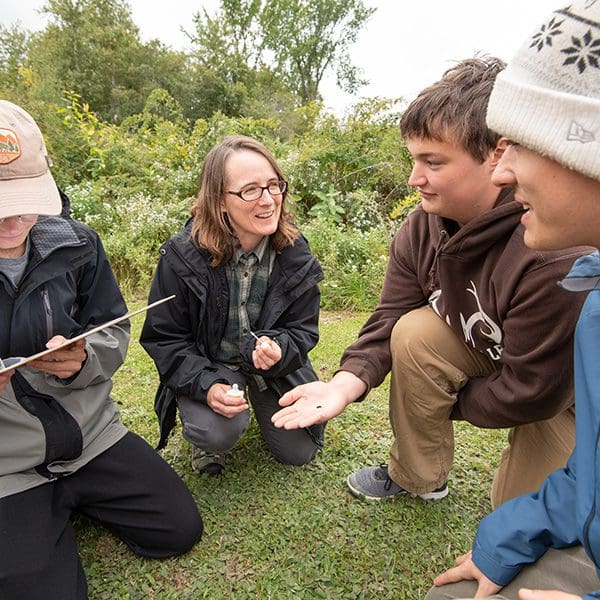
Consider All Sides
The world isn’t black and white and there is not always a definitive right and wrong.
ES 301 Environmental Ethics | 3 credits
Is the destruction of plant and animal lives for human use wrong? If so, why? Or should we think beyond simple categories like “right” and “wrong” since human-nature relationships involve so many actors – the people who level forests and kill animals, the customers who buy the products that result from this destruction, the disinterested masses who care more about other things, and the lives of the plants and animals themselves? While the topics might change from term to term, all versions of the course introduce basic philosophical frameworks that can help us navigate these and related questions. The goal is not to arrive a definite solutions, but to equip us to think and argue well, and to give us tools for arriving at our own rational views about complex environmental problems.
Contact Hybrid Learning Coach, Ashleigh Gordon, to sign up today!
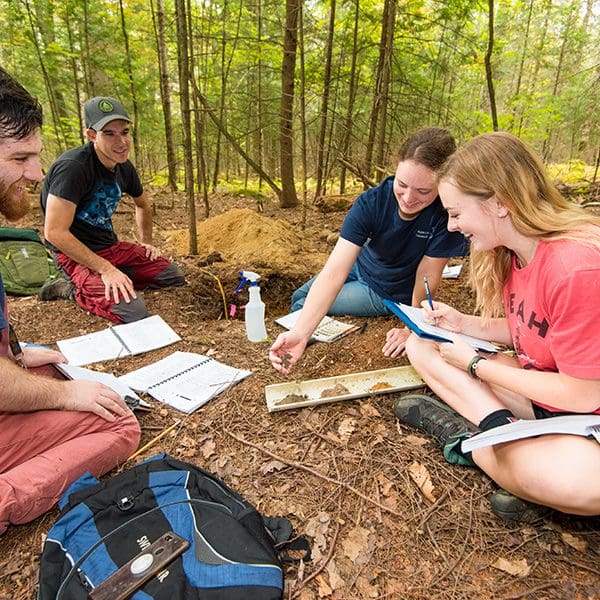
Managing the Environment
Explore the relationships between economic activities and sustainable development.
SU 301 Ecological Economics | 3 credits
Recognizing that infinite growth in the physical throughput of matter-energy in the human economy is impossible if the planet is finite, the field of environmental economics is concerned with the relationships between economic activities and sustainable development. In this course, students will learn foundational concepts related to economic markets (including externalities and market failure). They will study specific cases illustrating how market failure has led to environmental degradation and explore policies and valuation strategies for managing environmental and natural resources.
Contact Hybrid Learning Coach, Ashleigh Gordon, to sign up today!
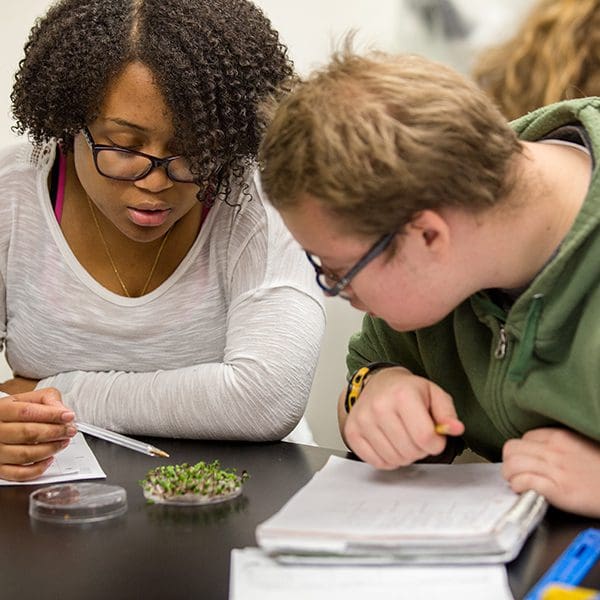
Monitoring Environmental Conditions
Learn how fundamental concepts such as kinetics and equilibrium relate to current environmental challenges.
CH 201 Environmental Chemistry | 3 credits
In this class, students will learn how fundamental concepts such as kinetics and equilibrium relate to current environmental challenges. They will study sources, reactions, transport, and impact of chemical species in air, water, and soil environments. Students will learn techniques for monitoring environmental conditions and analyzing samples in the laboratory.
Contact Hybrid Learning Coach, Ashleigh Gordon, to sign up today!
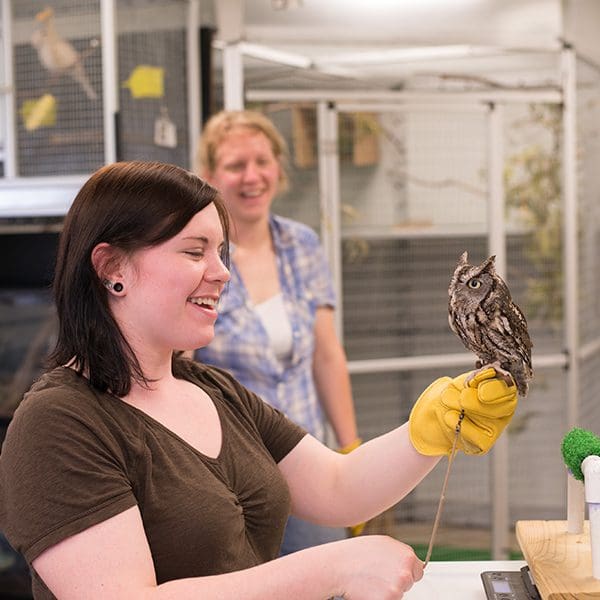
Animals from the Inside Out
Discover anatomical structures from the cellular to tissue, organ, and organismal levels.
BI 301 Comparative Animal Anatomy | 3 credits
This course involves detailed study of the different structural systems found in the global array spectrum of animals, including the underlying evolutionary relationships among the groups. Anatomical structures ranging from the cellular to tissue, organ, and organismal levels will be covered. Functional interpretations of anatomy are stressed, as well as their broader connection to the physiology and health of animals.
Contact Hybrid Learning Coach, Ashleigh Gordon, to sign up today!

All Things Soil
Discover the physical, chemical, and biological characteristics of soils.
NR 303 Soil Science | 3 credits
This course explores the physical, chemical, and biological characteristics of soils as related to their suitability to support plant cover, land use, and environmental quality. Students will describe soils, draw conclusions about their suitability for various uses, and make recommendations for soil management based on soil samples and laboratory analyses.
Contact Hybrid Learning Coach, Ashleigh Gordon, to sign up today!
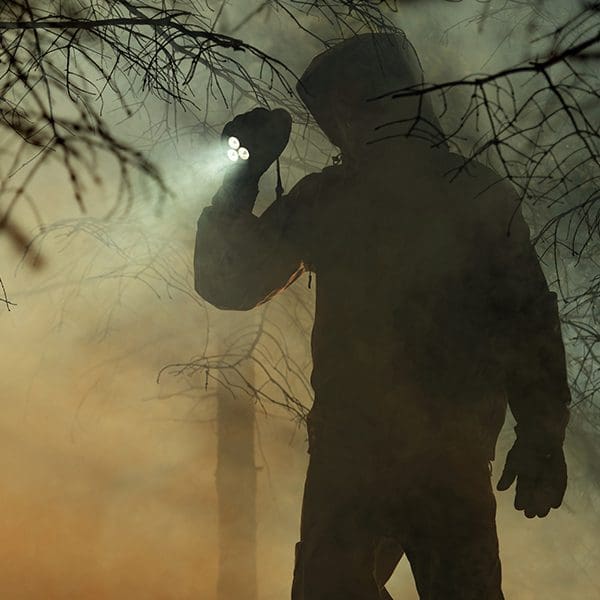
Search and Rescue
Learn techniques for decision-making, risk analysis and personal preparedness for field work in a variety of climactic and terrain conditions.
CL 280 Topics in Conservation Law Enforcement: Search and Rescue | 3 credits
Introduction to Search and Rescue will provide student exposure to the skills and knowledge necessary to operate effectively as a volunteer on a certified S.A.R. team or as a government agency employee tasked with SAR operations. Participants will learn and use basic tenets of the Incident Command System to organize theory appropriate responses to scenarios. They will learn techniques for decision-making, risk analysis and personal preparedness for field work in a variety of climactic and terrain conditions.
Contact Hybrid Learning Coach, Ashleigh Gordon, to sign up today!
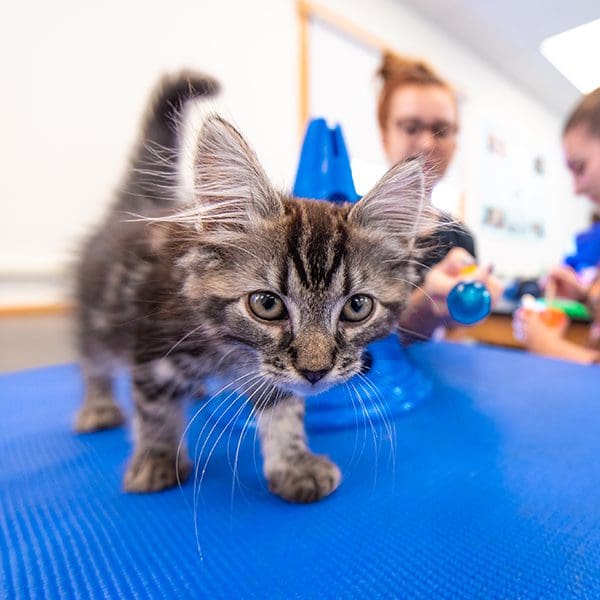
Comparative Animal Physiology
Study of the function of internal animal systems, from the cellular to the organ-system level.
BI 302 Comparative Animal Physiology | 3 credits
The course is a systematic study of the function of internal animal systems, from the cellular to the organ-system level. Particular emphasis will be placed on processes supporting organismal homeostasis, with examples from animals commonly found in wild and captive veterinary care. Throughout the term, you will investigate how environmental differences dictate the physiological strategies and responses of animals, including consequences to their health and well-being. Additional work will be focused on processes to collect physiological data, including analysis and interpretation for use in care of their health.
Contact Hybrid Learning Coach, Ashleigh Gordon, to sign up today!



